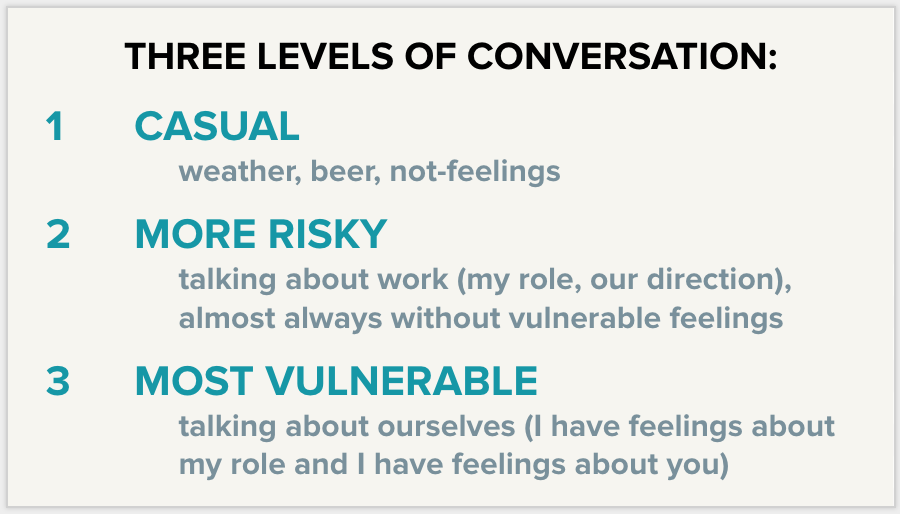
Part one is here.
Debt in relationships is very similar to tech debt. It represents the baggage of emotions accumulated by the founders in the decision-making process. These decisions may seem appropriate at the time they are made, but they can be detrimental in the long run - especially if not given proper attention. Many people prefer to avoid difficult and potentially emotional conversations by default, because often founders do not know how to communicate their thoughts constructively (or are afraid of partners' reactions).
Co-founding teams can handle relationship problems in short periods of time. However, if founders choose to avoid tough conversations, they harm the emotional background. In such situations, resentment and frustration builds up. which will not disappear if you do not pay attention to them and do not take any measures. Debt in a relationship can destroy the foundation of your company - your co-founder team. These psychological problems (and the controversies and hard feelings associated with them) kill team partnerships in the long run. Too much debt in relationships in a team that is not familiar with conflict resolution techniques causes startups to die because of internal problems, not external ones.
Founders: You need to learn to get into difficult conversations before debt in a relationship wipes out your cofounder team and your company.
These “difficult” conversations I call Level 3 conversations. Here's what I mean:

Level 1 conversations are usually casual and superficial. They'll probably talk about the weather, weekend plans, or other people. Conversations at the first level are positive because they generate rapport, but in them you will not exchange deep thoughts or sensitive information.
Next comes the second level, where there is already a small risk in conversations. Information in a conversation at Level 2 can contain thoughts about work in a narrow or broad sense, but without vulnerable and sensitive topics. There are no direct references like "I" or "we" in Level 2 conversation. Do not confuse this communication with honest and honest conversations at Level 3.
Conversations on the third level are the most honest and risky, and also touch on sensitive topics. They reveal your true thoughts and feelings about your role, performance (yours or your partners), or the direction your company is headed. It is at this level that effective feedback can be exchanged . In a conversation at level 3, sentences such as “I'm upset because it seems to me that you are not doing your part of the work”, “I am angry that you did not implement this function for our launch” or “I am afraid we are leaving For the wrong clients, we are wasting time and will not reach our targets. " Done correctly, Level 3 conversations will be transparent, mutually supportive and non-blaming.
Level 3 Conversations Deal With Relationship Debt
Only Level 3 conversations allow you to deal with debt in a relationship. Their goal is to bring vulnerable thoughts and feelings into a plane where they can be discussed and resolved. Because these conversations often involve vulnerable revelations, they are easy to avoid and easily spoiled. I beg you to take a chance and dive into them. Level 3 conversations can save your startup and / or your relationships with partners in situations where things are going to be bad, and can also strengthen your position when things are going well.
Here's a template you can use to initiate a Level 3 conversation:

You will not be able to solve a problem that you do not understand and that no one is talking about. This Level 3 Conversation Template allows you to deal with both. The essence of this conversation is that you share the influence that your partner's particular behavior has had on you. Then you will need to share your experience and move on to a solution to the problem that suits both parties to the conversation. Consider an example:
“When I was speaking at All Hands (x), you pulled out your phone and it confused me (y). The fact is that because of this, it seemed to me that the things that I say are not important, and I do not want to give the team unimportant information (z). What were you thinking at that moment? "
Both interlocutors must practice active listening to participate in the conversation at the third level. Verbatim repetition of what you heard from the interlocutor is a simple and effective way to learn this. Example: “Let me make sure I understand you correctly. When you checked your phone, you were waiting for a response from [NAME OF BIG VENTURE FUND], and you were so excited that you couldn't concentrate on what I was talking about. Is that correct? "
This template lacks your assumptions, judgments and ideas about the behavior of the interlocutor. In order to have a productive conversation at Level 3, you need to "stay in your own half of the field" - that is, consider the impact of your partner's behavior on the basis of clearly observable and specific actions with which you cannot argue.
Stay in your half of the field

When you enter into a conversation at Level 3, your goal is simply to convey your experience of your partner's observed and unconditional behavior (and the impact of that behavior), while leaving room for the other person to speak up.
Imagine having a Level 3 conversation like tennis or volleyball. Your "half of the field" (that is, your script) should only contain your experience related to the interlocutor's behavior (your emotions, suggestions and / or reactions) OR statements about specific, factual and clearly observable behavior - undeniable and harmless. You should try not to reach for the net in the middle of the field in order to get any guess about the motives, details, context or background of your interlocutor - leave him space to share all this in the conversation. Your task is to describe the impact of his behavior on you and provide specific facts about what happened. Nothing more.
It's important to note that it's okay if an emotional story follows on your part that turns out to be wrong (for example, the thought that your interlocutor pulled out his phone during your speech because he doesn't appreciate what you are saying). It is good if you fully understand yourself and can explain your reactions, since telling stories like these allows you to deal with distorted beliefs about yourself and other people's ideas about you. Being honest with your interlocutor about the emotions in telling the story (and without blame) will allow them to correct misconceptions in your script. This is the power of level 3 conversation (and we will talk about it in the following texts in this blog).
If you stay in your half of the field, you will be able to establish a dialogue with full attention and dedication from the interlocutor, since such a well-thought-out communication technique rarely leads to the manifestation of defensive reactions and emotions - it is these aspects that can dissuade your partner that you think similar way. We only defend ourselves when we feel that we are being attacked. If in a conversation you only talk about yourself and how you feel, then there will be nothing to attack!
What were you thinking at that moment?
Asking the other person's thoughts as your story unfolds is the magic trick that makes Level 3 conversations so productive and rewarding. If you manage to come to an agreement and understanding of each other's positions without condemnation, speculation and shame, then you will strengthen mutual trust and develop a deep understanding. This communication strengthens the cofounder team and lays the solid foundation that a startup needs to weather the storms and survive in the long term. Also, such conversations allow you to extract half of the information (the experience of another person) necessary to develop a solution that suits both parties.
Collaborative Problem Solving Bridging Gaps
As a result of such communication, you will gain access to complete information - your own experience and that of your partner, which means that you will be able to solve the problem in a way that satisfies the needs of everyone.
A conversation at level 3, in which you can share everything, listen to everything that the interlocutor wants to say, and only THEN solve the problem TOGETHER, turns the debt in a relationship from a professional and personal risk into an opportunity to strengthen your relationship and become closer to each other.
If you want to help with translations of useful materials from the YC library - write in a personal, @jethacker cart or mail alexey.stacenko@gmail.com
Follow the YC Startup Library news in Russian in the telegram channel or on Facebook...
Useful materials
- A selection of 143 translations of Paul Graham's essays (from 184)
- 75 lectures in Russian from Y Combinator (out of 172)
- Y Combinator: Russian-speaking founders
- What startups Y Combinator is looking for in 2020
- Chat Y Combinator in Russian
- Public on Facebook YCombinator in Russian